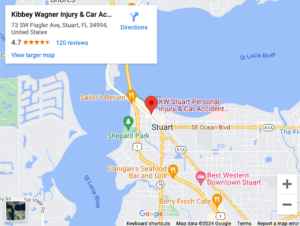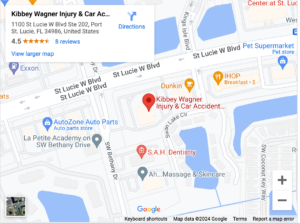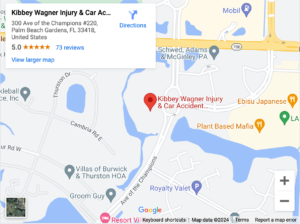
A personal injury case that arises in Stuart will almost certainly fall under the jurisdiction of Florida personal injury law. Although every case is different, it is possible to formulate a typical timeline that applies, more or less, to most cases.
At the Scene of the Accident
If you are seriously injured, your sole concern should be arranging for immediate medical treatment. The same is true if someone else is seriously injured.
To the extent that you are able, however, try to gather as much information as you can before you leave the scene of the accident, including:
- The names and contact details of everyone involved in the accident, including any eyewitnesses.
- Contact and insurance details for any possible at-fault party. This is a legal requirement in a traffic accident.
- Photographs of the scene of the accident, weather conditions, any damage to property, any injuries, and any other visual image that will shed light on the measure of damages and whose fault the accident was.
- In a traffic accident, don’t forget plate numbers and car registration, as well as the make, model, and year of any vehicles involved.
If the police can’t make it to the scene of the accident, you might end up having to file an accident report yourself.
Medical Treatment

If you even suspect that you might be injured, drop everything and head to the hospital when an ambulance arrives. You need to do this for four reasons:
- Some injuries, such as soft tissue injuries and traumatic brain injury (TBI), don’t show symptoms until later.
- The more you delay medical treatment, the more you will raise doubts about the severity of your injuries.
- Delaying treatment can provide the opposing party the chance to argue that you sustained your injuries only after the accident occurred.
- Failure to “mitigate your damages” by seeking prompt medical treatment can give an insurance company or a court reason to lower your monetary compensation.
If your injuries are short-term, you will need to wait until you reach Maximum Medical Improvement (MMI) before you file a claim. Only then will you know how much to ask for in your claim. If your injuries are long-term, you might need to hire an expert to help you calculate the value of your claim.
Initial Case Consultation With a Stuart Personal Injury Lawyer
An initial consultation with a Stuart personal injury lawyer can help you determine whether your claim is worth pursuing. It can also help you determine how much compensation to demand. If you decide to hire the lawyer, you will have an advocate who can help you every step of the way.
Initial Investigation
Gather as much evidence as you can over the next few weeks. This might include:
- The accident report, if any.
- Your medical records.
- Employment records documenting your lost earnings.
- If your injuries occurred in a traffic accident, the at-fault vehicle’s event data recorder, which records critical data about the accident, such as braking time. Most new cars contain event data recorders.
Ask your lawyer to suggest other types of evidence and to help you find this evidence. You might need to recruit an expert witness, for example.
Calculate Your Damages
Once you assemble preliminary evidence, you can attempt to estimate the true value of your claim. On the other hand, there might still be important evidence that is in the defendant’s possession. Remember, the value of your claim increases the more certain the defendant’s liability becomes.
File Your Claim
A claim is not the same as a lawsuit. Essentially, a claim is an abstract legal right to compensation. Although all lawsuits are based on claims, not all claims mature into lawsuits. Have your lawyer draft and send a demand letter in which you state your case and ask for compensation. Try to look at this as an invitation to negotiate rather than a final ultimatum.
Negotiate With the Opposing Party
The “opposing party” is probably going to be an insurance company, not the at-fault party. Initially, you can expect a flat denial of your claim or a “lowball” offer that you should reject. Arranging a medical lien with your healthcare provider, backed by your potential future personal injury compensation, will improve your bargaining position. This may be your last chance to resolve your claim within a few weeks.
File a Personal Injury or Wrongful Death Lawsuit
If the opposing party proves to be stubborn, it might be time to play hardball by filing a lawsuit. Filing a lawsuit will start the clock ticking toward a trial, which the opposing party probably doesn’t want. Remember, you can settle any time before trial.
To file a lawsuit, you must submit a carefully-drafted Complaint, pay a filing fee, and arrange for a neutral third party to deliver a court summons and a copy of the Complaint to the defendant.
Pretrial Discovery
Filing a lawsuit gives both you and the defendant access to the pretrial discovery process. Discovery is a way for each party to gather evidence that is in the possession of the other party. If the opposing party refuses to cooperate, you can seek a court action to demand compliance on the pain of sanctions. Pretrial discovery can take months or, in unusual cases, over a year.
Return to the Bargaining Table
Hopefully, at some point, you will have gathered enough evidence through pretrial discovery to place the opposing party at a decided disadvantage. If this happens, the opposing party will want to negotiate a settlement before trial just to get rid of you. This will be your chance to secure generous compensation.
Mediation
The court will probably be pushing you to mediate your dispute. Mediation, in which a third party attempts to help you resolve your dispute, could save you a lot of time. Remember that both parties will have to agree on the mediator, and a mediator cannot force a settlement on the parties.
Settlement Agreement
If you reach a settlement, you need to memorialize it in a formal written settlement agreement signed by both parties. Once both parties have signed the settlement agreement, you might still have to wait a few more weeks to receive your settlement check.
Trial
If you cannot reach a settlement, you might have to proceed to trial. Very few claims get to the trial stage, but some do.
A trial consists of the following stages:
- Jury selection.
- Opening statements.
- Presentation of evidence and witnesses. Cross-examination takes place during the stage.
- Closing arguments.
- Jury deliberation and verdict.
You can settle during the trial, even while the jury is deliberating.
Appeal
Typically, you have 30 days to appeal an unsatisfactory judgment. There is no way your appeal will succeed without strong grounds for it. Even with strong grounds, appeals courts typically defer to the judgment of lawyer courts.
Your Chances Are Better With an Experienced Stuart Personal Injury Attorney
A skilled Stuart personal injury attorney at Kibbey Wagner Injury & Car Accident Lawyers can multiply the value of your claim far beyond whatever you pay in legal fees. While no ethical attorney will offer you a guarantee of a particular result, your chances are far better with competent representation than without it. Most personal injury attorneys offer free initial case consultations as well. Contact us to provide you with a free consultation to discuss your legal rights and options today at (772) 444-7000.




